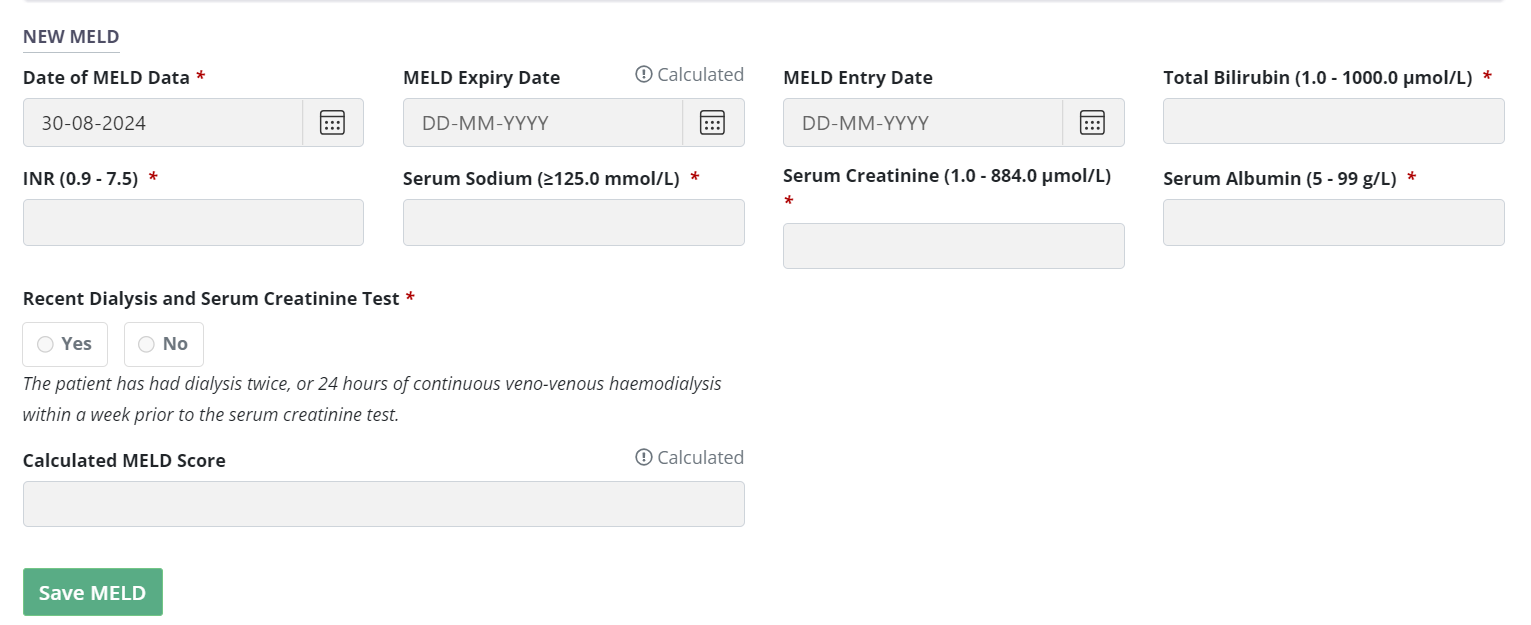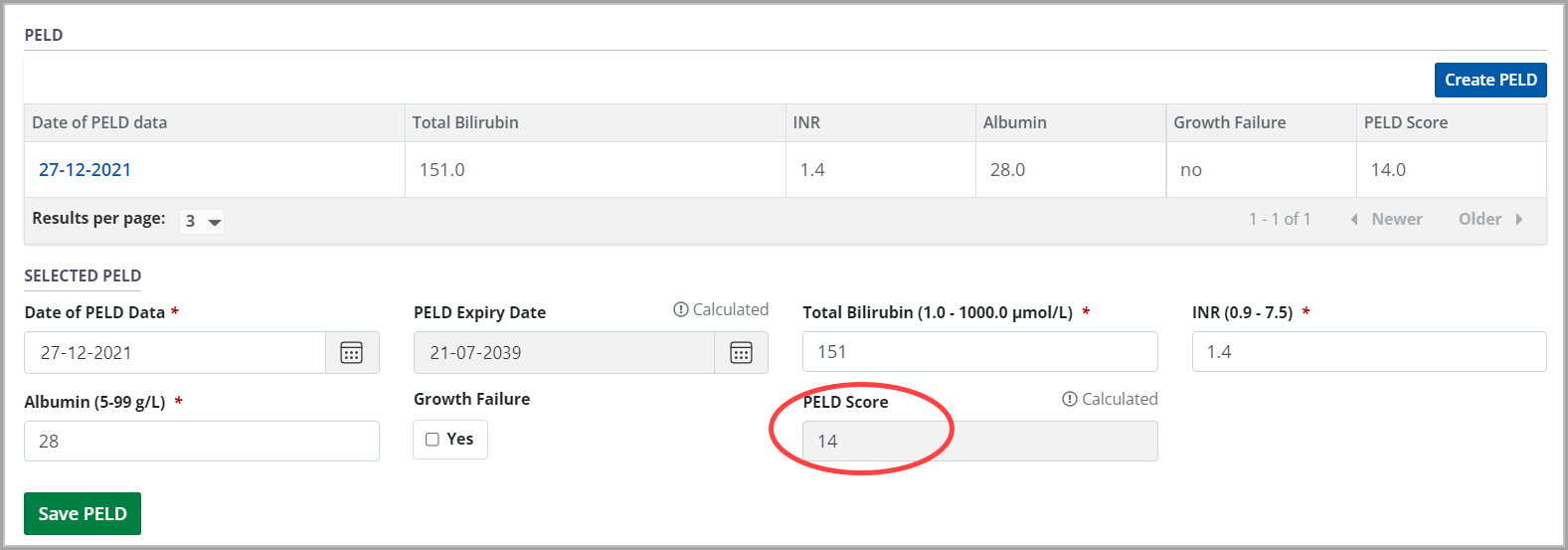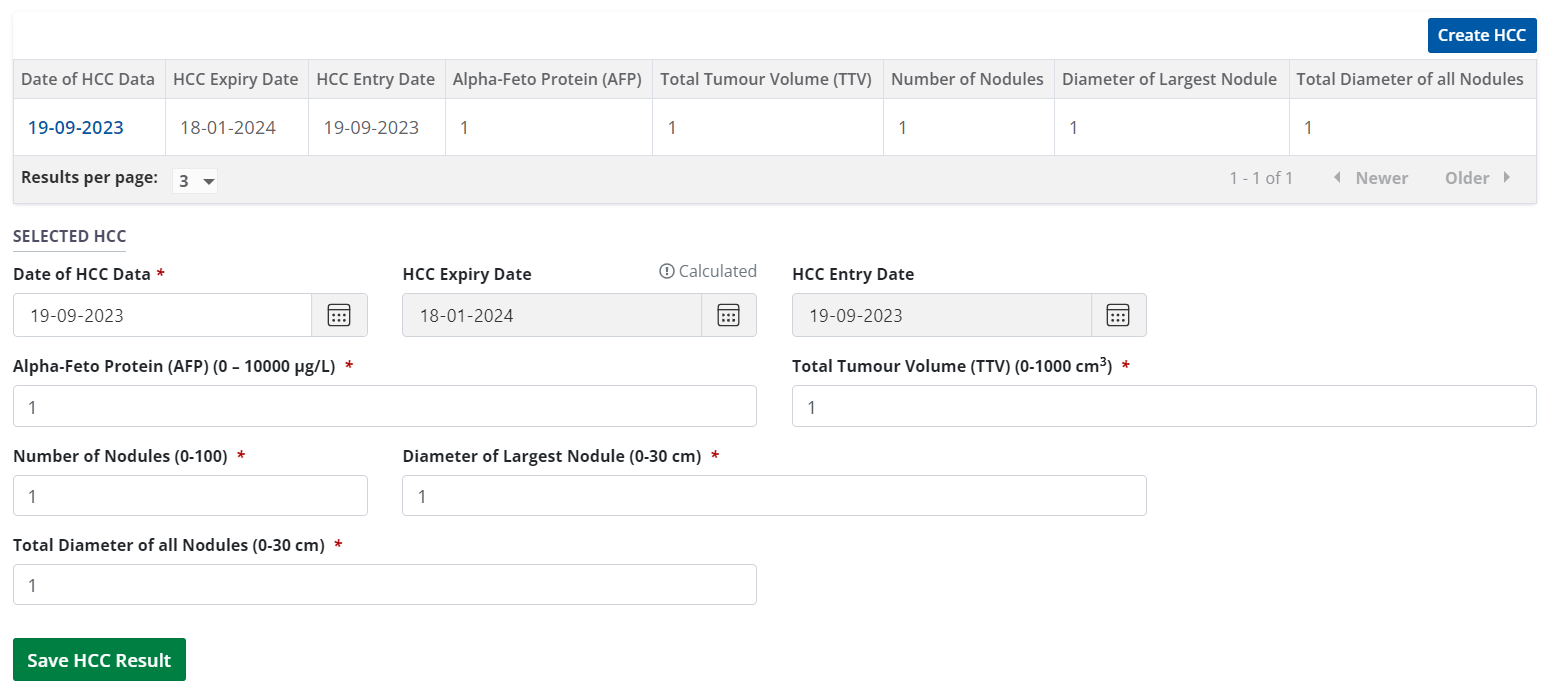About Allocation Scores for liver recipients
Intended audience: recipient coordinator transplant program admin
The system calculates an Allocation Score based on the recipient’s severity of liver disease. The worse the liver’s health, the greater the Allocation Score, and the higher the recipient will rank on liver allocations.
The system calculates the Allocation Score based on the information entered in the following sections of a recipient’s liver transplant journey page:
MELD test results (for recipients 12 or older).
PELD test results (for paediatric recipients under the age of 12).
HCC test results, if applicable.
Exception diseases, if any.
The system assigns the Allocation Score automatically in some situations, for example, if a recipient is waiting for a cluster of organs from a single donor.
Transplant programs may submit requests for exception points when a recipient’s Allocation Score does not reflect their disease severity. TGLN’s Special Case Committee has the authority to approve exception points and override a recipient’s calculated Allocation Score. See Apply Allocation Score overrides.
Allocation Score
A recipient's Allocation Score is the highest of their MELD, PELD, HCC, or exception diseases points. For example, if a recipient’s MELD points are 11, and their HCC points are 24, their Allocation Score is set to 24.
The maximum score is 43.
To see a recipient’s current and historical Allocation Scores, go to their profile, then select Liver > Liver Specific Details on the sidebar. The Allocation Score is presented at the top of the Liver Specific Details section.

The current Allocation Score is a calculated field and cannot be editted (except by a Special Case Committee appeal).
A table shows any history of Allocation Score calculations.
MELD
MELD is a numerical scale ranging from 11 (less ill) to 40 (gravely ill), used to assess medical urgency for adult liver recipients. The system calculates points based on blood test results (see Manage MELD test result).
MELD test results are valid for 90days. Test results must be updated every 90 days for adult (18+) recipients, otherwise, the system places MELD Suspension on the Liver (or Liver Cluster) journey.
An adult recipient who has a MELD test score of 11 or more can be added to the waitlist. A paediatric recipient (under 18) can be added with any MELD or PELD score. The highest possible score is 40.

Paediatric Points
PELD is a scoring system similar to MELD, but is used for recipients under 12 years of age. The system calculates the score based on PELD test results (see Manage PELD test results).
The system automatically assigns 24 exception points to paediatric recipients (listed before age 18). These exception points automatically increase by three points every 90 days while the recipient is on the waitlist until transplanted or removed from the waitlist, up to a maximum of 39 points.
Paediatric recipients with a calculated PELD or MELD that exceeds their paediatric exception points score will receive an Allocation Score equal to their calculated PELD or MELD.
Paediatric recipients with a calculated PELD or MELD score (candidates aged >12) greater than 25 and who meet other specific criteria will be assigned 43 points.

HCC
HCC (hepatocellular carcinoma, or liver cancer) exception points are calculated based on measurements and counts of carcinomas (see Manage HCC results). These points only apply to liver recipients with HCC.
A recipient is considered:
Out of Criteria (does not qualify for HCC exception points) if measurements fall below guidelines, or
In Criteria (does qualify for HCC exception points) if measurements are within guidelines.
HCC test results are valid for 90 days. Test results must be updated every 90 days or the system places an HCC suspension on the Liver (or Liver Cluster) journey.
The system assigns 22 HCC exception points when the recipient is first deemed In Criteria. The system automatically increases HCC exception points by three points every 90 days up to a maximum of 30 points if the recipient remains In Criteria.
Recipients who have HCC but are Out of Criteria:
Report MELD test results to get an Allocation Score, and
-
Are added to the waitlist, even if the MELD is less than 11.

HCC bridging and downstaging therapies
Bridging therapies and Downstaging therapies can reduce tumours while the recipient is on the waitlist, pending transplant surgery..
The recurring 90 day measurements may indicate that the therapies have reduced carcinomas to levels that would normally be Out of Criteria. However, if a liver recipient has ever been deemed In Criteria, the system calculates and applies HCC exception points when new measurements are reported, even if the recipient would normally be Out of Criteria.
Exception diseases
The system calculates exception disease for recipients meeting specific criteria for various liver diseases. (see Manage exception diseases for more details).

Other automatic calculations
Liver-lung or liver-heart clusters
Adult and paediatric candidates requiring a liver-lung cluster or a liver-heart cluster from the same donor for a simultaneous transplant procedure will be assigned a score of 42 points.
Liver-bowel clusters
If the recipient is waiting for a liver/bowel transplant from the same donor, the system assigns points as follows:
Adult candidates requiring a liver-bowel cluster from the same donor for a simultaneous transplant procedure will get a baseline of 22 points plus 10% for the risk of three month mortality and a three point increase plus 10% every 90 days up to a maximum of 40 points.
Paediatric candidates requiring a liver-bowel cluster from the same donor for a simultaneous transplant procedure will get a baseline of 30 points and if not transplanted within 30 days will be assigned 38 points.
Liver-kidney or liver-pancreas clusters
Adult and paediatric candidates requiring a liver-kidney cluster or a liver-pancreas cluster from the same donor for a simultaneous transplant procedure will get a baseline of 22 points and a three point increase every 90 days up to a maximum of 40.
Special Case Committee (SCC) overrides
Transplant programs may submit requests for exception points to TGLN’s Special Case Committee when a recipient’s SMC Score does not reflect their disease severity. If a request is approved by the Special Case Committee, authorized TGLN users can manually adjust the SMC Score (see Apply SMC Score override).
See related topics
TGLN document: Ontario Deceased Donor Liver & Liver-Bowel Transplantation Allocation Algorithm
